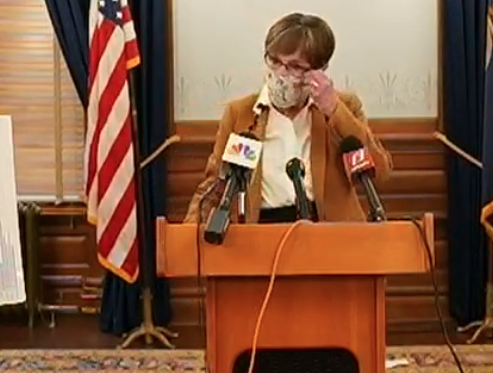
MISSION, Kan. (AP) — Gov. Laura Kelly’s planned order requiring Kansas residents to wear masks to slow the spread of the coronavirus could be toothless in many parts of the state because counties can exempt themselves and even those that don’t, might not enforce it.
Officials in some counties already were signalling Tuesday that they planned to opt out of Kelly’s mandate. The order, which Kelly is expected to issue Thursday ahead of it taking effect Friday, was to make masks mandatory in stores, restaurants and in any situation where social distancing of 6 feet cannot be maintained, including outside.
Wyandotte County, in the Kansas City area, and Douglas County, home to the main University of Kansas campus, already require masks.
In Sedgwick County, which home to the state’s largest city, Wichita, County Commissioner Jim Howell said he has been inundated with emails since Kelly announced the mask requirement Monday.
“In our state we love our freedom,” Howell said. “In practice we can encourage and educate. And then we have to trust them to make the best decision for themselves and their family.”
Kansas has seen a spike in confirmed coronavirus cases since May 26, when Kelly lifted statewide restrictions on businesses and public gathering and left decisions to the state’s 105 counties. The Democratic governor had faced complaints for weeks from the Republican-controlled Legislature that she was too slow in reopening the state’s economy.
The state Department of Health and Environment reported 14,443 cases as of Monday, which was up by more than 3,000, or 26.5%, in the previous two weeks. Kansas also reported 270 COVID-19-related deaths, which was an increase of 25, or 10%, over the previous two weeks.
During those two weeks, reported cases tied to gatherings, such as groups in bars and restaurants, church events and family get-togethers, increased by 55%, up 110 to 311.
Warren Howe, a salesman for a fire alarm, extinguisher and safety-training company, said as he ate lunch at the Burger Stand in Topeka that Kelly’s executive order “makes sense” in areas like the Kansas capital.
“I’m not living out in small town western Kansas where I think it would probably be a different situation, but I don’t think it’s an issue with so many people,” Howe said. “It’s a temporary thing to do our thing to stay safe.”
In Topeka’s home county, Shawnee, the health officer issued an order limiting bars to operating from 10 a.m. to 2 p.m. and 5 p.m. to 10 p.m. starting Thursday. They will also have to close their dance floors.
Sedgwick County’s top medical official is recommending limits on restaurant occupancy and a ban on large sports tournaments and similar activities that draw participants from states with high coronavirus rates. During the two weeks ending Monday, Sedgwick County saw a nearly 66% increase in reported cases, up 500 to 1,260.
Lacey Cruse, another Sedgwick County commissioner, called a mask requirement “one of the best options to keep people employed and out and about” while trying to check the pandemic.
But even with recent increases, Sedgwick County has 2.44 reported cases per 1,000 residents, less than half the state’s figure of 4.96. And Howell asked about a mask requirement, “How in the world are we going to enforce it?”
“Are we going to issue tickets and fines and potential jail time for people who refuse to wear masks in public?” he said.
In Riley County in northeast Kansas, the city of Manhattan is considering a mask requirement after outbreaks in its Aggieville bar and restaurant district near the Kansas State University campus. But County Commissioner John Ford said most of the people who’ve reached out to him oppose a mandate — even if they’re pro-mask.
“It’s the ‘logistics,’” he said. “How do we get 18- to 20-years-old to comply?”
In Russell County, Commissioner Don Boxberger said he has been getting calls from people not wanting a mask requirement as the commission prepares to discuss it Monday. The rural western Kansas county, which relies on farming, cattle and oil wells, is one of just eight in the state still without a reported coronavirus case.
“People are saying they don’t want to do it and they aren’t going to do it,” said Boxberger, who said he hasn’t decided how to vote but is leaning against a mandate.
Russell County Administrator John Fletcher, a former sheriff, said even if local officials wanted to require masks, the sheriff’s department couldn’t enforce the rule.
“There’s no way we’d have the resources,” he said.






